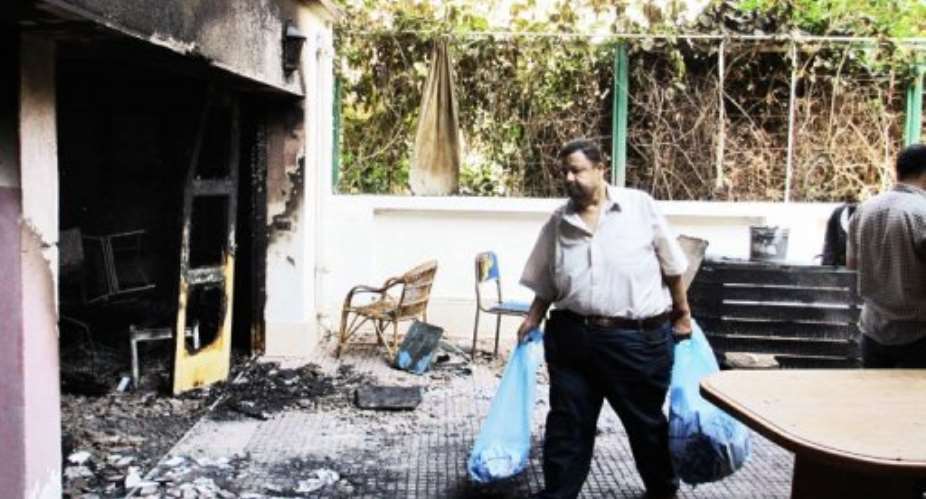CAIRO (AFP) - Egypt's cabinet is to meet Tuesday after the presidential election turned violent when protesters torched the offices of a runoff candidate from the regime of ousted president Hosni Mubarak.
Protesters set fire to the headquarters of former prime minister Ahmad Shafiq, angered after the electoral commission announced he would face an Islamist rival in a runoff for president.
Media reports said the cabinet would hold a meeting in the wake of the attack, after a senior military official said the army had plans to deal with any violence ahead of the decisive election.
Police, who put their forces on alert, said eight suspects were arrested near the office following the attack, which came hours after electoral officials said that the holdover from Mubarak's regime would face the Muslim Brotherhood's Mohammed Mursi in the second round vote on June 16-17.
The protesters ransacked Shafiq's office, according to an AFP correspondent who visited the building in the middle class Dokki neighbourhood of Cairo on Tuesday.
The assailants had broken or toppled every piece of furniture inside the two-storey villa late on Monday, and also set alight an annex of the headquarters.
Several doors, windows and mirrors inside the office were broken, while the street outside the villa was littered with campaign leaflets which cleaners were busy collecting.
"The premises will be refurbished and Mr. Shafiq will continue to use them to lead his campaign," said Ahmed Abdel Ghani, a Shafiq supporter.
After the attack, some of the protesters returned to Cairo's iconic Tahrir Square, throwing Shafiq's campaign leaflets on to the street.
Many appeared to be supporters of an unsuccessful leftwing candidate and opposed both Shafiq and Mursi.
There were no immediate reports of injuries at the headquarters and firefighters said the blaze was quickly put under control.
"We were inside when they attacked us," one member of Shafiq's campaign staff said, without identifying himself. "They set fire to the garage that had general Shafiq's campaign literature."
Earlier around 1,000 protesters had gathered in Tahrir Square to protest Shafiq's presence on the runoff ballot.
"Shafiq will be president when I'm dead," read one poster on a car parked in the square, the hub of last year's uprising.
Announcing the results, electoral commission chief Faruq Sultan had said no candidate won a majority in the first-round vote on May 23-24, so the two with the highest votes, Mursi and Shafiq, would enter a runoff.
Mursi had won with 24.77 percent of the votes, slightly ahead of Shafiq with 23.66 percent.
Leftist candidate Hamdeen Sabbahi came third with 20.71 percent, ahead of moderate Islamist Abdel Moneim Abul Fotouh with 17.47 percent.
Former foreign minister Amr Mussa was fifth, trailing with 11.12 percent.
The commission put the official turnout in the vote -- the first since the 2011 uprising that ousted Mubarak -- at 46 percent of the 50 million people eligible to cast ballots in the historic election.
Both Mursi and Shafiq, who represent polar opposites in the country's fragmented politics after last year's uprising, are now trying to court the support of the losing candidates and their voters.
The Brotherhood, which alienated many other political parties after its domination of parliamentary elections last winter, has warned Egypt would be in danger if Shafiq wins and has pledged to become more inclusive.
Two of the losing candidates, Mussa and Abul Fotouh, declined to endorse either of the frontrunners, however.
A pending legal case could have serious implications for Shafiq's bid for the presidency.
Egypt's Supreme Constitutional Court is expected to rule on June 11 in a key case examining the constitutionality of a law barring senior Mubarak-era officials from running for office, according to the state-owned Al-Akhbar.
The contest presents a difficult choice for activists who led the revolt. For them, choosing Shafiq would be to admit the revolution had failed, but a vote for Mursi could threaten the very freedoms they fought for.
The presidential poll has followed a tumultuous military-led transition from autocratic rule marked by political upheaval and bloodshed, but which also witnessed free parliamentary elections, which saw Egypt's two main Islamist parties clinch nearly three quarters of the 498 seats in the legislature.
The Supreme Council of the Armed Forces, in power since Mubarak's downfall, has pledged to restore Egypt to civilian rule by the end of June.





 We’ll no longer tolerate your empty, unwarranted attacks – TUC blasts Prof Adei
We’ll no longer tolerate your empty, unwarranted attacks – TUC blasts Prof Adei
 Bawumia donates GHc200,000 to support Madina fire victims
Bawumia donates GHc200,000 to support Madina fire victims
 IMF to disburse US$360million third tranche to Ghana without creditors MoU
IMF to disburse US$360million third tranche to Ghana without creditors MoU
 Truck owner share insights into train collision incident
Truck owner share insights into train collision incident
 Paramount chief of Bassare Traditional Area passes on
Paramount chief of Bassare Traditional Area passes on
 Two teachers in court over alleged illegal possession of BECE papers
Two teachers in court over alleged illegal possession of BECE papers
 Sunyani: Victim allegedly shot by traditional warriors appeals for justice
Sunyani: Victim allegedly shot by traditional warriors appeals for justice
 Mahama vows to scrap teacher licensure exams, review Free SHS policy
Mahama vows to scrap teacher licensure exams, review Free SHS policy
 Government will replace burnt Madina shops with a new three-story, 120-store fac...
Government will replace burnt Madina shops with a new three-story, 120-store fac...
